
|
 |
The LPA Newsletter,
Mid-January 2007
Dear Fellow Landlord,
 When I first became a landlord, I was convinced that all you had to do was buy as many properties as possible to become successful, and the rest would take care of itself. Then I was slammed in the face with the reality of dealing with tenants! They just don't always do what you want, do they? Well, I needed a system. I developed a system years later after learning all kinds of hard lessons in property management. Below, please read my article about holding properties with tenants for long term appreciation. When I first became a landlord, I was convinced that all you had to do was buy as many properties as possible to become successful, and the rest would take care of itself. Then I was slammed in the face with the reality of dealing with tenants! They just don't always do what you want, do they? Well, I needed a system. I developed a system years later after learning all kinds of hard lessons in property management. Below, please read my article about holding properties with tenants for long term appreciation.
In this newsletter:
Article from LPA member Jack Klein on how to prevent frozen pipes.
My landlording article, "The Secret Career Killer..."
New LPA Features: - Search the Landlord & Q&A Forum Search for topics or keywords
- Search the whole LPA site for the subject you want to learn about
More tenant Excuses
More Success Quotes
If you missed the Free Downloads and Articles of our last newsletter, click here for all our Free Forms
Please e-mail us if you have any questions or would like to add or share any material / information. Have a great month and an even more successful year ahead.
John Nuzzolese
John@theLPA.com
***********************************************

Winterization Tips
Prevent Frozen and Thawing Pipes:
Submitted by LPA Member, Jack Klein
Each year we have to remember to takes steps to protect our rental properties from the forces of winter. Below are a few plumbing tips I got from The American Red Cross.
Why pipe freezing is a problem
Water has a unique property in that it expands as it freezes. This expansion puts tremendous pressure on whatever is containing it, including metal or plastic pipes. No matter the "strength" of a container, expanding water can cause pipes to break. Pipes that freeze most frequently are those that are exposed to severe cold, like outdoor hose bibs, swimming pool supply lines, water sprinkler lines, and water supply pipes in unheated interior areas like basements and crawl spaces, attics, garages, or kitchen cabinets. Also, pipes that run against exterior walls that have little or no insulation are also subject to freezing.
Pipe freezing is a particular problem in warmer climates where pipes often run through uninsulated or underinsulated attics or crawl spaces.
Preventing Frozen Pipes
Before the onset of cold weather, prevent freezing of these water supply lines and pipes by following these recommendations:
Drain water from swimming pool and water sprinkler supply lines following manufacturer's or installer's directions. Do not put antifreeze in these lines unless directed. Antifreeze is environmentally harmful, and is dangerous to humans, pets, wildlife, and landscaping. Remove, drain, and store hoses used outdoors. Close inside valves supplying outdoor hose bibs. Open the outside hose bibs to allow water to drain. Keep the outside valve open so that any water remaining in the pipe can expand without causing the pipe to break. Check around the home for other areas where water supply lines are located and are in unheated areas.  Look in the basement, crawl space, attic, garage, and under kitchen and bathroom cabinets. Both hot and cold water pipes in these areas should be insulated. A hot water supply line can freeze just as a cold water supply
line can freeze if the water is not running through the pipe and the water temperature in the pipe is cold. Consider installing specific products made to insulate water pipes like a "pipe sleeve" or installing UL-listed "heat tape," "heat cable," or similar materials on exposed water pipes. Many products are available at your local building supplies retailer. Pipes should be carefully wrapped, with ends butted tightly and joints wrapped with tape. Follow manufacturer's recommendations for installing and using these products. Newspaper can provide some degree of insulation and protection to exposed pipes - even ¼" of newspaper can provide significant protection in areas that usually do not have frequent or prolonged temperatures below freezing. Look in the basement, crawl space, attic, garage, and under kitchen and bathroom cabinets. Both hot and cold water pipes in these areas should be insulated. A hot water supply line can freeze just as a cold water supply
line can freeze if the water is not running through the pipe and the water temperature in the pipe is cold. Consider installing specific products made to insulate water pipes like a "pipe sleeve" or installing UL-listed "heat tape," "heat cable," or similar materials on exposed water pipes. Many products are available at your local building supplies retailer. Pipes should be carefully wrapped, with ends butted tightly and joints wrapped with tape. Follow manufacturer's recommendations for installing and using these products. Newspaper can provide some degree of insulation and protection to exposed pipes - even ¼" of newspaper can provide significant protection in areas that usually do not have frequent or prolonged temperatures below freezing.
During Cold Weather, Take Preventive Action
Keep garage doors closed if there are water supply lines in the garage. Open kitchen and bathroom cabinet doors to allow warmer air to circulate around the plumbing. Be sure to move any harmful cleaners and household chemicals up out of the reach of children. When the weather is very cold outside, let the cold water drip from the faucet served by exposed pipes. Running water through the pipe - even at a trickle - helps prevent pipes from freezing because the temperature of the water running through it is above freezing. Keep the thermostat set to the same temperature both during the day and at night. By temporarily suspending the use of lower nighttime temperatures, you may incur a higher heating bill, but you can prevent a much more costly repair job if pipes freeze and burst. If you will be going away during cold weather, leave the heat on in your home, set to a temperature no lower than 55ºF.
To Thaw Frozen Pipes
 If you turn on a faucet and only a trickle comes out, suspect a frozen pipe. Locate the suspected frozen area of the water pipe. Likely places include pipes running against exterior walls or where your water service enters your home through the foundation.
If you turn on a faucet and only a trickle comes out, suspect a frozen pipe. Locate the suspected frozen area of the water pipe. Likely places include pipes running against exterior walls or where your water service enters your home through the foundation. Keep the faucet open. As you treat the frozen pipe and the frozen area begins to melt, water will begin to flow through the frozen area. Running water through the pipe will help melt more ice in the pipe. Apply heat to the section of pipe using an electric heating pad wrapped around the pipe, and electric hair dryer, a portable space heater (kept away from flammable materials), or wrapping pipes with towels soaked in hot water. Do not use a blowtorch, kerosene or propane heater, charcoal stove, or other open flame device. A blowtorch can make water in a frozen pipe boil and cause the pipe to explode. All open flames in homes present a serious fire danger, as well as a severe risk of exposure to lethal carbon monoxide. Apply heat until full water pressure is restored. If you are unable to locate the frozen area, if the frozen area is not accessible, or if you can not thaw the pipe, call a licensed plumber. Check all other faucets in your home to find out if you have additional frozen pipes. If one pipe freezes, others may freeze, too.
Future Protection
Consider relocating exposed pipes to provide increased protection from freezing. Pipes can be relocated by a professional if the home is remodeled.
Add insulation added to attics, basements, and crawl spaces. Insulation will maintain higher temperatures in these areas.
For more information, please contact a licensed plumber or building professional.
For more information on disaster safety, check out: www.redcross.org/disaster/safety
or contact your local American Red Cross Chapter.
Heating frozen pipes with a torch is very dangerous, especially if both ends of the pipe are frozen and the pipe is heated from the center. Direct intense heat applied to the center of frozen pipes is likely to cause the water to flash into steam. This steam can cause an extreme build up of pressure that can result in an explosion. Thus it us much better to apply slow gradual heat when thawing frozen pipes.
***********************************************
Our new Search feature is available from our homepage and on the Landlord Q&A Forum.
Search the LPA Forum or Site for a topic or keyword:

***********************************************
Access alternate formats and lettersized versions of the forms yourself!
***********************************************

The Secret Career Killer Facing Real Estate Investors
So, you want to be a real estate investor? You are probably thinking the way I did when I started as a real estate investor. I thought the most important objective was to buy as many properties as possible. Well, I was only half right.
As an investor in residential real estate, being able to purchase properties that will allow you to make money is paramount. While there are various methods you can use to make your real estate fortune, the two most common plans are quite simple.
Buy and flip. This is when you purchase a property and sell it for a higher price. Many investors will find "Handyman Specials" or "Fixer Uppers" at a low price to improve and sell at a higher price. Sometimes you are fortunate enough to find an excellent opportunity requiring little or no work, only to resell for a quick and easy profit.
Although this is a common way to make money in real estate, many investors choose not to sell their investment property.
Buy and hold. This is when the real estate investor becomes a landlord in order to enable the investment property to generate income. Holding onto the property is also a way to allow the investment to appreciate in value over time. Why? The demand for residential real estate continues to grow and people are willing to pay top dollar for a place to live. What can be better than that? You have an asset appreciating in value plus you also have a tenant to pay your expenses on the property. You may even have a positive cash flow.
So what is "The Secret Career Killer Facing Real Estate Investors"? Before I answer that question, let me ask you,
- What happens when you put investment properties together with tenants?
- You get a landlord tenant relationship. I wish I realized the ramifications earlier.
Tenant problems are the one of the biggest reasons, if not, the biggest reason most landlords quit investing in real estate and sell their rental properties way before benefiting from one of the best features of owning real estate: appreciation.
It is just as important to learn the secrets of landlord protection and property management as it is to know how to accumulate rental property. Let me say it another way: Without knowledge of landlord protection, you as a landlord, are in big trouble!
Think about how much money people spend on books, seminars and trial and error learning about buying real estate. It's incredible! I invested so much money learning creative ways to buy property. How about you? How much have you invested learning to be an efficient landlord? Most landlords learn their lessons the hard way like I did. Fortunately, now there are some books and websites on landlord topics that can shed some light on the subject and allow average landlords and “Newbies” to become educated and aware of their legal rights concerning landlord – tenant relationships.
What good is struggling and sacrificing to own a lot of properties only to bail out because of overwhelming tenant problems?
Get educated in the art of "landlord protection". Learn how to avoid tenant problems so you can keep buying more investment property.
The three most important landlord issues to learn about for your own protection are:
- Screening and Tenant Selection
- I always say, "95% of tenant problems can be eliminated in the screening process!" It really is so true. A lot goes into screening a tenant properly, so try not to jump into any lease agreements without doing your homework first. The article, How to Screen Tenants in 5 Easy Steps will help you break down what to do when it comes to screening your potential tenants. The idea is to make the screening process as simple as possible for you while helping you to eliminate the unqualified prospects and focus on the more promising ones.
- Using a solid landlord lease
- One of the keys to a good landlord – tenant relationship is having both parties involved come to an understanding and agree with the terms in the rental contract. All too often we hear of and see tenant problems that could have been avoided if only the parties had used a better lease agreement. The problems usually stem from an issue that the lease should have covered, but did not. Most of the traditional leases are designed to make both parties happy, especially the tenants. Conventional leases are politically correct not to offend tenants and often leave the landlord wide open and prone to problems with the tenancy. Unless the landlord takes steps to protect himself in his lease agreement, the law will offer the tenants a strong bundle of rights giving them a legal advantage.
- Lease Enforcement
- Even with the greatest lease agreement in the world, a landlord faces a myriad of potential tenant problems. Enforcing the lease has to start the moment you sit down with the tenant at the lease signing. I know you may still be in the negotiating stage on certain items concerned in the lease, but enforcing the lease begins here. Reading the entire lease, clause by clause, emphasizing topics that are important to you reinforces your terms from that point on. Later on, when lease infractions occur, you must be prepared to jump on the issues professionally and immediately. Having the proper landlord forms to enforce your lease is essential. Using forms to correct tenant problems is both professional and efficient because you are creating an official record on paper of your legal communications concerning the events at hand. From an Urgent Late Notice to a more serious Eviction Notice served properly on a tenant, the landlord projects a far more professional image. The objective of the lease enforcement forms is to squash small tenant problems quickly and professionally before they develop into full blown disasters, while snapping the tenant back in compliance with your lease agreement.
If you have experienced the unpleasant part of being a landlord which includes loss of rent, possible foreclosure, loss of sleep, confrontations with unreasonable tenants, expensive repairs and restoration, vandalism, theft, squatters, evictions, legal fees, you may have had to consider if it's all worth it or not. Many new new investor / landlords decide quit the landlording business soon after a bad tenant experience.
As a real estate investor who intends to be a landlord and enjoy that excellent long term appreciation, it is absolutely imperative to have some landlording knowledge. I strongly recommend having more landlord tenant knowledge than your tenants do!
Happy investing and landlording!

Printer
Friendly Version of this Article
***********************************************
Tenant Excuses
"I'm pregnant and having a miscarriage." - I did feel bad for her the first time- but when she used the same excuse 3 months later I realized I'd been foiled! - Michelle, Michigan
"I waited for you to come by and pick it up. I wasn't going to wait forever so I spent it." - Why do you think I gave you pre-addressed envelopes, MORON? Eviction time! AAAAAHHH!!! - Perry C., Brooklyn, NY
"You know I don't have the money. If you harass me one more time, I'm leaving." - They are behind more than a month. I don't think it is harassment. I hope they do leave because I'm ready to hire a lawyer. - Angie H., Mission Viejo, CA
***********************************************
Quotations...
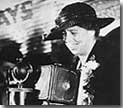



"All men who have acheived great things have been dreamers." - Orison Swett Marden
"Rather fail with honor than succed by fraud." - Ralph Waldo Emerson
"Love is life... And if you miss love, you miss life." - Leo Buscaglia
"How much did your last tenant problem cost you?"
- John Nuzzolese
***********************************************
America's #1 real estate expert is also an LPA Member!
The Landlord's Troubleshooter and more Real Estate Books By Robert Irwin
Robert Irwin is the bestselling author of more than 50 books on real estate. His career in the real estate industry encompasses more than three decades of experience as real estate broker, landlord, and consultant to lenders, agents, and investors.

***********************************************
Books by LPA Members
The Landlord Protection Agency is proud to recommend the following landlord books written by LPA Members, Robert Irwin, Timothy Spangler, Tony & Sandy Midea and Dan Auito. Just click on the book for more information about it.
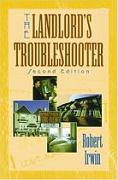
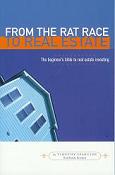
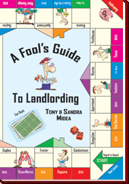

***********************************************

LPA Membership Expiring?
Take Advantage of the Renewal Prices!
How to Check your LPA Membership Expiration Date:
- Be logged in with your LPA username & password
- On the "Main Menu" (top right), click on "Your Orders" (right below your name)
- The beginning date of your membership will be listed to the left of your membership order # in this format: YYYYMMDD
|
NEW! Save Money with our Promotional Membership Renewal Prices!
*Your Membership Expired? No Problem!
|
|

***********************************************
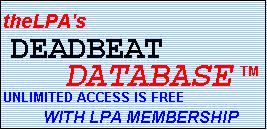
***********************************************
Make money as an LPA Affiliate!
Starting 6/1/07: We're DOUBLING your referral fees so you can earn twice as much!
No more 10% referral fee, it will now be 20%!
 Earn a 10% commission on all
orders placed with The Landlord Protection Agency by customers that you
refer to us! Earn a 10% commission on all
orders placed with The Landlord Protection Agency by customers that you
refer to us!
You get paid for each order placed through your specially coded internet address for The LPA site!
How many landlords do you know?
Join The LPA Affiliate
Program!
***********************************************
 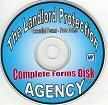 SPECIAL
BONUS
SPECIAL
BONUS
for New 2
-5 year LPA Members
This offer also applies to 2-5 year Membership Renewals!
Check out our low renewal prices
*Your Membership Expired? No Problem!
***********************************************

***********************************************
The LPA's

Free Bonus for all LPA Members.... Click for more information.
***********************************************
Interested in past LPA Newsletters?
Feel free to view the
LPA Newsletter Archive
|
 |



Look-up
Associations
Attorneys
Businesses
Rentals Available
Rentals Wanted
Classifieds
Tips & Advice
Realty Brokers
Tenant Histories
Other Areas
Q&A Forum
Landlord Tenant Law
Essential Forms
Free Forms
Credit Reports
About Us
Help
|







 Look in the basement, crawl space, attic, garage, and under kitchen and bathroom cabinets. Both hot and cold water pipes in these areas should be insulated. A hot water supply line can freeze just as a cold water supply
line can freeze if the water is not running through the pipe and the water temperature in the pipe is cold.
Look in the basement, crawl space, attic, garage, and under kitchen and bathroom cabinets. Both hot and cold water pipes in these areas should be insulated. A hot water supply line can freeze just as a cold water supply
line can freeze if the water is not running through the pipe and the water temperature in the pipe is cold. 














 Earn a 10% commission on all
orders placed with The Landlord Protection Agency by customers that you
refer to us!
Earn a 10% commission on all
orders placed with The Landlord Protection Agency by customers that you
refer to us!




